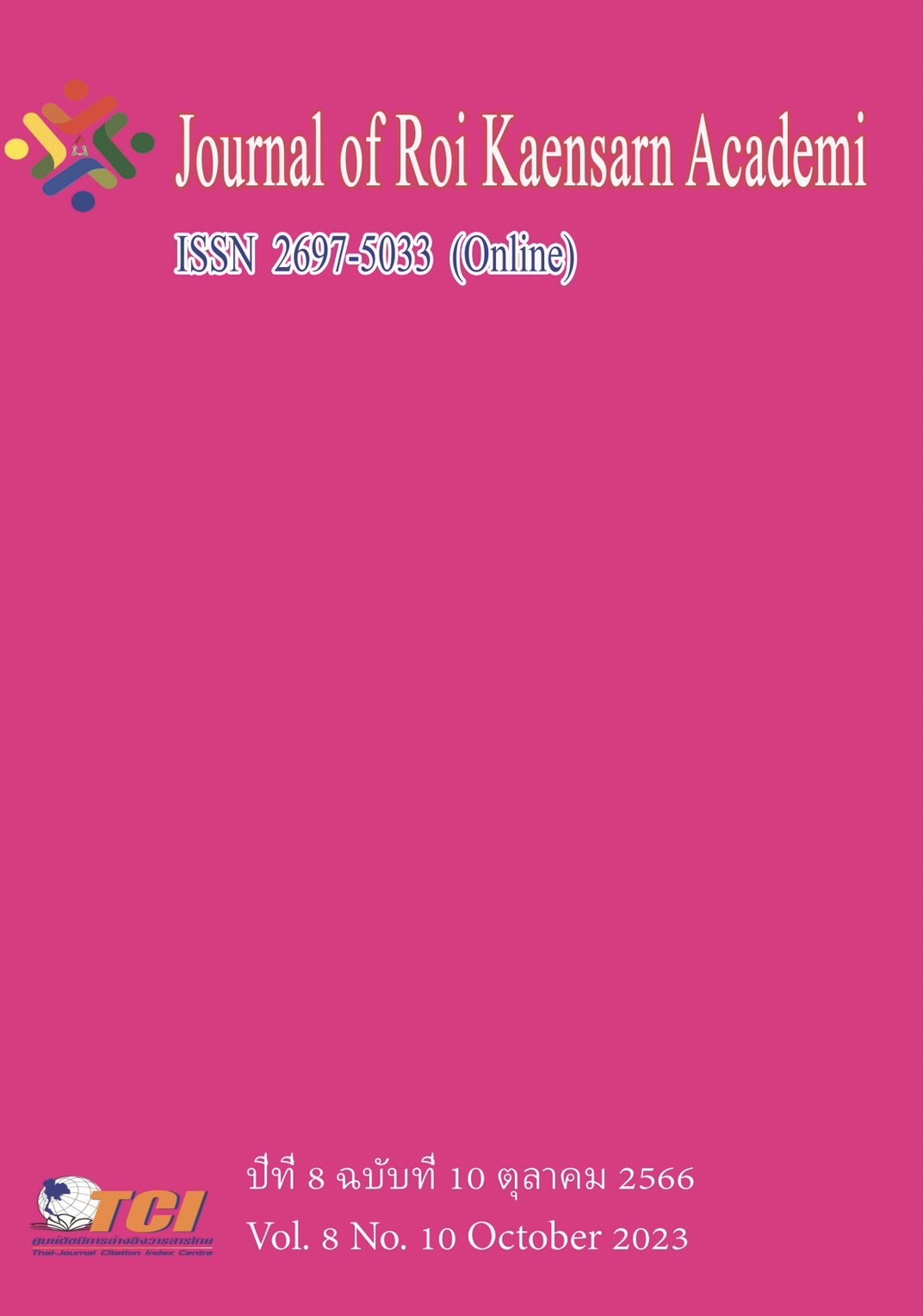The Development of an Action Plan for Enhancing Teachers’ Innovative Leadership Based on Organization Culture at Primary Schools in Best Educational Organization, China
Main Article Content
บทคัดย่อ
This study mainly aimed to explore the relationship between teachers’ innovative leadership and school organizational culture; examine the effect of demographic factors on teachers' innovative leadership and school organizational culture; and to develop an action plan for better teachers’ leadership in primary schools of Best Educational Organization in China. Through systematic literature review, the researcher developed a questionnaire to survey teachers’ innovative leadership and school organizational culture. A total of 390 full-time teachers from three primary schools of Best Educational Organization in China was used as the target group. Based on the qualitative and quantitative analyses, the study developed a model and proposed an action plan and put it into the implementation for a term. Finally, the findings showed that: 1) Teachers’ perception of innovative leadership before implementing the action plan was at a moderate level in this study. 2)Teachers’ overall perception of school organizational culture was at a high level. 3). Teachers' perceptions of innovative leadership and their perception of school organizational culture were significantly different according to their demographic factors such as age, service years, and position. 4) Teachers' perceptions of innovative leadership were highly positively correlated with perceptions of school organizational culture. 5) Teachers' innovative leadership after implementing the action plan was improved. Discussion based on each research objective was conducted and recommendations for the schools and teacher were provided by the end of the study.
Article Details
เอกสารอ้างอิง
Ackerman, R. & Mackenzie, S.V. (2006). Uncovering teachers’ leadership. Educational Leadership, 63 (8), 66-70.
Anderson, D., & Anderson, L. A. (2001). The change leader's roadmap: How to navigate your organization's transformation. San Francisco: Jossey-Bass.
Baker-Doyle, K. J. (2017). How can community organizations support Urban transformative teachers’ leadership? Lessons from three successful alliances. The Educational Forum, 81 (4), 450-466.
Barley, S. (1986). Organization culture: Can it be a source of sustained competitive advantage? Academy of Management Review, 11, 656-665
Cheng, A.Y., & Szeto, E. (2016). Teachers’ leadership development and principal facilitation: Novice teachers’ perspectives. Teaching and Teacher Education, 58, 140-148.
Chew, J.O.A., & Andrews, D. (2010). Enabling teachers to become pedagogical leaders: Case studies of two IDEAS schools in Singapore and Australia. Educational Research for Policy and Practice, 9 (1), 59-74.
Clemson-Ingram, R., & Fessler, R. (1997). Innovative programs for teachers’ leadership. Action in Teacher Education, 19 (3), 95-106.
Dan, Y. (2021) The development of a self-leadership model to increase students’ creativity at University in Yunna Province, China. Education Administration and Leadership Graduate School of Human Science, Assumption university of Thailand.
DiMaggio, K. E. (2007). Teachers’ leadership: Does it result in higher student achievement? A study of the relationship between different aspects of teachers’ leadership and student achievement (Unpublished doctoral dissertation). The George Washington University, Washington, District of Columbia.
Evans, P. M. (2003). A principal's dilemmas: Theory and reality of school redesign. Phi Delta Kappan, 84 (6), 424-437
Forster, E. M. (1997). Teachers’ leadership: Professional rights and responsibility. Action in teacher education, 19 (3), 82-94.
Frost, D., & Durrant, J. (2003). Teachers’ leadership: Rationale, strategy, and impact. School leadership & management, 23 (2), 173-186.
Gong, T. (2011). Leadership building of female teachers in ethnic villages in Guangxi-taking
Napo County in Guangxi as an example. Journal of China Women's University, (2), 52-
Hairon, S., Goh, J. W. P., & Chua, C. S. K. (2015). Teachers’ leadership enactment in professional learning community contexts: Towards a better understanding of the phenomenon. School Leadership & Management, 35 (2), 163-182.
Harris, A. (2003). Teachers’ leadership as distributed leadership: Heresy, fantasy, or possibility? School Leadership & Management, 23 (3), 313-324.
Leithwood, K., Jantzi, D., & Steinbach, R. (1999). Changing leadership for changing times. London: McGraw-Hill Education (UK).
Leslie Lu, & Chen, Z. (2007). Empowering Teachers: Teachers’ leadership in Teacher Professional Development. Teacher Education Research, 19 (4), 1-5.
Levenson, M.R. (2014). Pathways to teachers’ leadership: Emerging models, Changing roles. Cambridge, MA: Harvard Education Press.
Martin, J. M. (2006). That’s the way we do things around here: An overview of organizational culture. Electronic Journal of Academic and Special Librarianship, 7 (1), 12-19.
Moorhead, G., & Griffin, R. (1998). Need-Based perspectives on motivation. Boston: Houghton Mifflin Company.
Muijs, D., & Harris, A. (2006). Teacher led school improvement: Teachers’ leadership in the UK. Teaching and teacher education, 22 (8), 961-972.
Murphy, J. (2005). Connecting teachers’ leadership and school improvement. Thousand Oaks, CA: Corwin Press.
Peggigrew, A. M. (1979). On studying organizational cultures. Administrative Science Quarterly, 24, 570-581.
Pellicer, L. O., & Anderson, L. W. (1995). A handbook for teacher leaders. Thousand Oaks, CA: Corwin Press.
Saravanan. S, (2013). A Study on Organizational Culture in Tamil Nadu Newsprint and papers Limited, Karur-Tamil Nadu, Vinayaka Mission’s Kiruoananda Variyar Engineering College.
Schein, E.H. (1985). Organizational culture and leadership: A dynamic view. San Francisco, CA: Jossey-Bass.
Snoek, M., Enthoven, M., Kessels, J., & Volman, M. (2017). Increasing the impact of a master’s programme on teachers’ leadership and school development by means of boundary crossing. International Journal of Leadership in Education, 20 (1), 26-56.
Song, D. Hu, Y., & Yuan, L. (2009). Investigation on the present situation of school organizational culture in primary and secondary schools in Beijing. Teacher Education Research, 21 (3), 56-61.
Song, H., Hu, Y., & Yang, Li. (2007). The study on the school organizational culture in Beijing. Teacher Education Research, 21 (12), 25-28.
Wenner, J. A., & Campbell, T. (2017). The theoretical and empirical basis of teachers’ leadership: A review of literature. Review of educational research, 87 (1), 134-171.
York-Barr, J., & Duke, K. (2004). What do we know about teachers’ leadership? Findings from two decades of scholarship. Review of Educational Research, 74 (3), 225-316.

